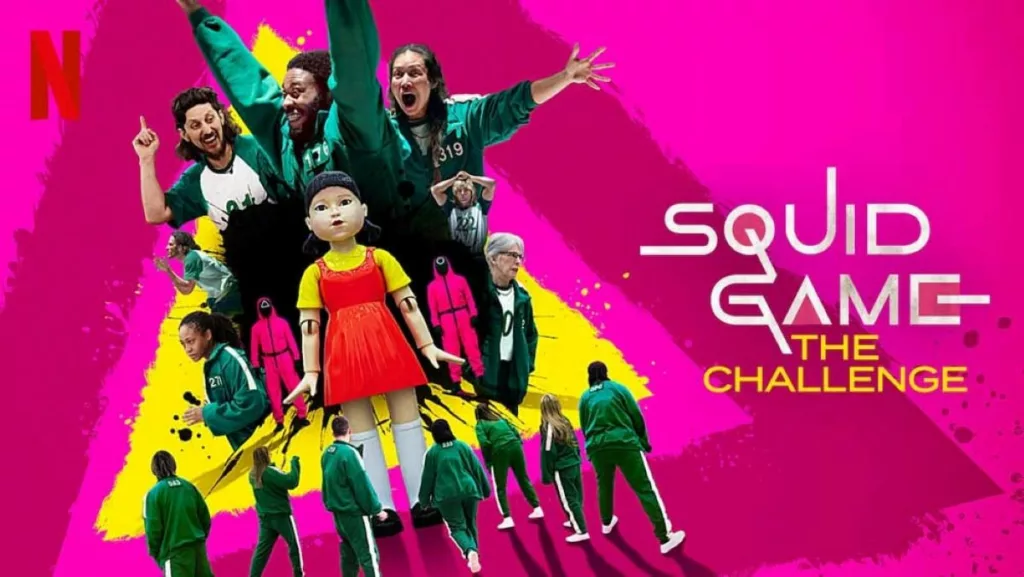Table of Contents
Brutal? Sure. But Squid Game struck a chord by tapping into the desperation so many feel trying to survive in today’s economy. Behind the theatrics, it asked an uncomfortable question: What would you risk for a clean slate?
Now Netflix is raising the stakes with Squid Game: The Challenge, a reality competition bringing the show’s iconic challenges to life. Forget TV budgets and special effects – this time it’s all real. 456 competitors will face off in a series of games inspired by the original show, vying for the largest cash prize in reality history at $4.56 million.
Thankfully there won’t be actual casualties like in the scripted series. But make no mistake, the danger feels all too real for these players with so much on the line. Ink packs simulate bullet wounds, adding to the tension.
As an admirer of the social commentary in Squid Game, I’ve got mixed feelings about this spectacle. Do these people understand what they’re signing up for – both physically and morally? However it shakes out, one thing’s for sure – a concept this outrageous deserves a watch. Let the games begin!
A Deadly Format With (Mostly) Safe Twists
At its core, Squid Game: The Challenge will feel comfortingly familiar to reality competition fans. We’ve got 456 strangers battling through a series of games with elimination on the line. Survivor, Big Brother – we know the beats. But that’s about all that feels familiar once these unorthodox challenges kick off.
Just like the fictional games of the Netflix hit, each round of Squid Game: The Challenge resurrects iconic childhood competitions with special twists. In Red Light Green Light, players race towards a finish line, freezing at the eerie cue of a giant animatronic doll. One foot out of place means their “death” via a fake blood splatter. Cookie-cutting shapes, tug of war – these schoolyard classics become tests of nerve and precision.
The stakes? A record-smashing $4.56 million dollar grand prize awaits the final victor – the richest single payout in reality TV history. Considering the average player entered the game $10,000 in debt, it’s life-changing money.
Of course, Squid Game without real casualties would lose its sinister edge. That’s where the ink packs come in. Each “eliminated” player gets an exploding blood squib for a grimmest-timeline effect. It’s just Hollywood magic, but as players reenact their own “deaths,” it makes for queasy entertainment. Are they trivializing the message of the original? Perhaps, but it stands out from trite reality fare.
While the challenges avoid real violence, they offer mental gauntlets, judging by the show’s early ethical controversies. I’m unsure if unlocking that cash justifies what the creators put them through. But for devoted fans and morbidly curious viewers like me, this social experiment is too outrageous to ignore.
Fame-Seekers, Villains, and Surprising Heroes
Diving into any reality competition means preparing for some archetypal characters. We expect fame-seeking divas, loose-cannon villains, unexpected underdogs. And at first, Squid Game: The Challenge seems happy to deliver on clichés.
Many players posture with what clearly seems like pre-planned “reality personas” from the jump – quippy confessionals full of one-liners built for memes. It’s no shock in the Instagram age, but causes some awkward tonal clashes with the show’s dark premise. Still, for fans of messy TV drama, some early standouts emerge – like the audacious Contestant 432.
This former college athlete ruffles feathers fast, orchestrating brash all-male alliances and sparking fights. His ego seems tailor-made for cameras. “How does one get good at Battleship?” he deadpans in one ridiculous confessional. His overconfidence makes us yearn for some karma.
Of course as the games whittle down the roster, a subtle shift occurs in the remaining players – suddenly that pre-packaged flavor gives way to more nuance. Turns out boisterous Contestant 432 lacks the cleverness to keep skating by on brawn alone when games require actual strategy.
And the underdogs rise up – like fan-favorite granny Contestant 302. At 64 years old, she’s there competing alongside her supportive son, impressing everyone with her resilience and grit. When 432 foolishly selects her team for an extra-punishing challenge, her epic response shatters assumptions. 302’s warrior spirit redefines what a “hero” looks like.
As easy targets and short-term villains fall, we get glimpses of real people beneath – more raw vulnerability and authenticity. The games hit an introspective note as remaining players reconsider their motivations. And we’re reminded not to take first impressions as bond in this pressure cooker.
Of course, showrunners still manipulate things, if accusations of rigging are true. So do late-stage “characters” reflect reality or calculated casting? Likely some of both, but the shifting social dynamics make for hypnotic viewing either way. Just like in the fictional Squid Game, the best and worst of human nature comes out to play.
Uneasy Questions Behind the Scenes
Reality shows often spin up controversial questions about participant treatment and authenticity. But Squid Game: The Challenge seems especially plagued by troubling reports from behind the curtains. Accusations of physical duress and competition rigging raise uneasy doubts.
Several anonymous players have come forward about health scares and manipulation during filming. Contestants purportedly endured hours standing still for certain challenges – resulting in dizziness and collapse for some. The showrunners stand accused of intentionally sabotaging certain players to shape dramatic outcomes.
While shady producer antics are nothing new in reality TV, the circumstances here seem particularly unsettling. When real people roleplay a fictional game about the desperation of capitalism, what ethical lines get crossed for entertainment’s sake?
It’s worth examining our own appetites as viewers too. Are we numb to the brutality here because we enjoyed the storybook version so much? The original used visceral shocks to highlight real social horrors. But witnessing actual humans reenact “executions”, even staged, feels different to me – and more sinister. What happened to that cutting commentary when brought into the real world?
Perhaps I’m being selectively squeamish. Physical challenges on shows like Survivor have hospitalized people too. But something about this format sticks out as dodgy – the way it gamifiesoriginal traumas for a hunger-games effect. Can a reality show circumvent real trauma when it asks ordinary people to tap into fictional extremes? Given the accusations, apparently not.
Between possible participant exploitation and the voyeuristic viewer appeal, Squid Game: The Challenge raises moral red flags to me. But reasonable minds can disagree on interpreting complex issues in pop culture. If nothing else, it has us reconsidering questions about ends justifying means when it comes to our entertainment. Certainly conversations worth having.
The Squid Game Reality Gambit: Genius or Exploitation?
As a social experiment meets reality spectacle, Squid Game: The Challenge makes for dangerously addictive viewing. Surviving the games does prove an even playing field, with contests relying as much on ethics and wits as physicality – unlike brute-centric shows like Survivor. And the unfamiliar format inspires fresh competitiveness – no proven strategies means open opportunity.
Watching everyday people tapped into fight-or-flight mode also fascinates. We get that rare reality gift of strangers united by high pressure as their true colors emerge. The creators maximize tension, blurring lines between competition and morality. It’s a captivating psychological gauntlet.
But the appeal relies on trauma entertainment – the kind arguably best left to fiction. As players express relief at surviving, it risks trivializing the original show’s graphic pertinent message about economic exploitation. And reports of actual behind-the-scenes distress seem to defeat the purpose.
Ultimately Squid Game: The Challenge contains glimmers of genius but wades too far into murky waters for my taste. It energies reality television with much-needed audacity and diversity. However glossing over real suffering for ratings gives me pause. If we must recreate a fictional capitalist nightmare, additional safeguards seem essential lest the creators undermine their own dangerous fable in the name of entertainment.
With so much reality television numbing our sensitivities though, I suspect much of the audience is willing to overlook ethical quibbles. At its best, this show manages biting introspection between visceral thrills. But the ends can’t justify all means. Here’s hoping some reform addresses valid controversies before another season greenlight.
What’s Next for This Viral Spinoff?
Squid Game: The Challenge concludes its supersized first season as a definite conversation starter – if nothing else for sheer audacity. But the reality gamble’s success seems to guarantee more insulation in that winner’s sphere for future installments.
Assuming fixes address urgent controversies about participant treatment, I expect Netflix greenlights a sophomore round. However the creators might improve the formula next time. Player feedback suggests better living conditions and less random elimination challenges would be welcome.
I’d love to see the casting widen beyond archetypes too for more authenticity – maybe recruit from different walks of life. Nurses, teachers, blue-collar workers all enduring 2020-era burns could resonate.
If the goal stays to echo the original show’s themes, highlighting economic diversity makes sense – as long as safety limitations are installed. Perhaps bonus rewards for cooperation over competition too – make that cash temping but not everything.
The televised social experiment concept clearly has legs; that much seems assured by international reaction. Where exactly Squid Game: The Challenge travels in its development gives me chills for wrong and right reasons. Let’s hope more voices steer it towards uplifting territory next round.
Brace Yourself for the Next Viral TV Sensation
Love it or hate it, Squid Game: The Challenge will sink its hooks into popular culture as audiences eat up the drama and debate the controversies. However you spin it, a reality series that manages to recreate fictionalized brutality with and for real people makes for an alarmingly addictive bombardment of our senses and ethics.
As far as execution goes, Netflix and the creators deliver a slick product that outwits most reality television for sheer vision and nerve. The challenges and contestant dynamics prove more dynamic than the usual tried-and-true formulas. Factoring in the internet-shattering connection to Squid Game mania, they’ve got a certified new hit on their hands.
But profitable entertainment and ethical entertainment don’t always overlap – and this show blurs lines to its own detriment. The accusations of behind-the-scenes exploitation already tarnish the proceedings for me. Moving forward, reforms better prioritize participant safety and transparency.
Do the ends justify the means with a project this avant-garde? I can’t offer a definitive yes or no. At the very least, Squid Game: The Challenge compels worldwide conversations about what we’re willing to digest for spectacle and where we draw the lines. Get ready – because this viral TV concept won’t be the last of its kind. But hopefully the conversation propels more conscious reality programming.
The Review
Squid Game: The Challenge
Squid Game: The Challenge brings the breakout Netflix hit to the reality stage with mixed results. As a fresh competitive format, it certainly delivers addictive drama and watercooler buzz. But the ethical murkiness around exploiting real trauma for entertainment dampens the appeal. While I can’t fully write off such a headline-grabbing social experiment out the gate, the allegations of participant mistreatment already taint this one for me. Let’s hope some reform happens before another attention-grabbing season.
PROS
- Innovative games and challenges unlike other reality competitions
- Massive cash prize ups the stakes
- Compelling contestant personalities and character arcs
- Draws in fans of the original Squid Game
- Buzzworthy premise attracts wider audience
CONS
- Allegations of behind-the-scenes participant exploitation
- Ethical issues around gamifying traumatic fictional scenarios
- Tonal clashes between satire and real competition
- Manipulation accusations undermine authenticity
- Glorifies brutality of the original series

